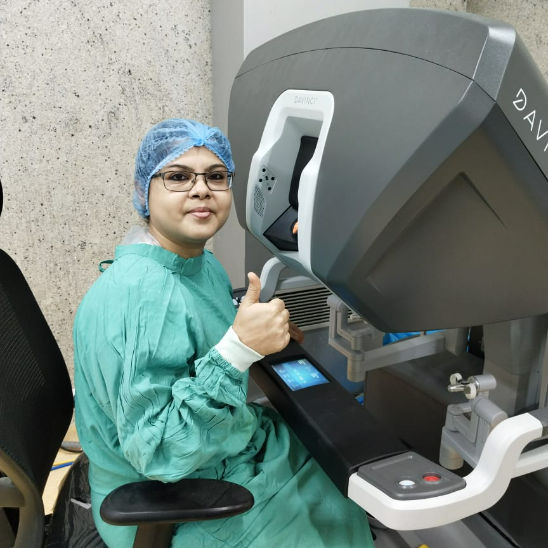Breast Cancer Awareness Campaign: All You Need To Know About Breast Cancer!
Assess the importance of breast cancer awareness campaigns, from understanding risk factors and early detection to promoting prevention and support. Understand how awareness drives timely action and can save lives.

Written by
Last updated on 13th Jan, 2026
Being one of the most prevalent diseases, breast cancer awareness campaigns aim to educate individuals on risk factors, symptoms, screening methods, and treatment options while also providing support for those affected. By spreading knowledge and promoting proactive healthcare, these campaigns play a vital role in reducing the burden of breast cancer.
Global statistics reveal the urgency of breast cancer awareness efforts. According to the World Health Organization (WHO), breast cancer accounts for a significant percentage of cancer-related deaths among women. However, early detection, improved treatments, and lifestyle changes have contributed to increased survival rates over the years. These statistics highlight the need for continued education, outreach, and funding for breast cancer research.
Understanding Breast Cancer
Breast cancer occurs when abnormal cells in the breast tissue multiply uncontrollably, forming tumours that can be either benign (non-cancerous) or malignant (cancerous). It most commonly originates in the milk ducts (ductal carcinoma) or lobules (lobular carcinoma) but can also develop in other breast tissues. If left untreated, cancer cells can spread to nearby lymph nodes and other parts of the body.
Types and Stages of Breast Cancer
Stage 0: Non-invasive cancer (ductal carcinoma in situ, DCIS).
Stage I-II: Early-stage cancer with minimal spread beyond the breast.
Stage III: Cancer has spread to lymph nodes but remains treatable.
Stage IV: Metastatic cancer, meaning it has spread to other organs.
Understanding the classification of breast cancer helps patients and healthcare providers develop effective treatment plans and predict outcomes.
Risk Factors for Breast Cancer
Breast cancer risk is influenced by a combination of genetic, environmental, and lifestyle factors. While some factors are beyond an individual’s control, others can be managed through lifestyle changes.
Genetic and Family History
Individuals with a first-degree relative (mother, sister, or daughter) diagnosed with breast cancer have a higher risk.
Inherited gene mutations, such as BRCA1 and BRCA2, increase susceptibility to breast and ovarian cancer.
Genetic testing helps high-risk individuals take preventive measures or increase screening frequency.
Lifestyle and Environmental Factors
Excessive alcohol consumption, smoking, obesity, and a sedentary lifestyle are linked to a higher risk.
Prolonged hormone replacement therapy (HRT) and late pregnancies may increase the risk.
Exposure to radiation and environmental toxins can also contribute to breast cancer development.
Making healthy lifestyle choices can significantly reduce risk and improve overall well-being.
Symptoms and Early Detection
Recognising early signs of breast cancer is critical for successful treatment. Many breast cancers are detected through self-examinations, routine screenings, or medical check-ups.
Some of the common symptoms include:
Lump or thickening in the breast or underarm
Changes in breast size, shape, or texture
Persistent breast pain or tenderness
Nipple changes, such as discharge, inversion, or scaling
Skin changes, including redness, dimpling, or swelling
Because some cases of breast cancer do not present obvious symptoms, regular mammograms and self-examinations are essential.
Mammography: The most effective tool for early detection, capable of identifying tumours before they are palpable.
Self-examinations: Help individuals become familiar with their breast tissue, making it easier to spot changes.
Clinical breast exams: Conducted by a healthcare provider to detect abnormalities.
Encouraging women to prioritise screenings and awareness empowers them to take control of their health.
Diagnosis and Treatment Options
When breast cancer is suspected, healthcare providers use various diagnostic tests and procedures to confirm the presence of cancer and determine its stage. These tests may include:
Mammography: X-ray imaging of the breast
Ultrasound and MRI: Additional imaging for detailed evaluation
Biopsy: Removal of a tissue sample for laboratory analysis
Genetic and hormone receptor testing: Determines the best treatment approach
Once diagnosed, patients have several treatment options, including:
Surgery- Lumpectomy (removal of the tumour) or mastectomy (removal of the breast)
Radiation therapy- Targets cancer cells with high-energy rays
Chemotherapy- Uses drugs to destroy cancer cells or shrink tumours before surgery
Hormone therapy- Blocks estrogen and progesterone in hormone-sensitive cancers
Targeted therapy- Focuses on specific cancer cell markers, such as HER2-positive cancers
The treatment plan depends on the cancer stage, type, and individual patient factors. Advancements in medical research have led to more personalised treatment options, improving survival rates and quality of life for many patients.
The Role of Lifestyle in Prevention
Adopting a healthy lifestyle can significantly reduce the risk of developing breast cancer. Maintaining a balanced diet rich in fruits, vegetables, and whole grains helps support overall health. Reducing the intake of processed foods, sugar, and red meats may also lower cancer risk.
Regular physical activity has been shown to decrease the likelihood of breast cancer by improving immune function, regulating hormones, and maintaining a healthy weight. Engaging in moderate exercise, such as walking, yoga, or strength training, can have long-term health benefits.
Reducing alcohol and tobacco use is another crucial preventive measure. Studies have linked excessive alcohol consumption to an increased risk of breast cancer, as alcohol can raise estrogen levels and contribute to cancer cell growth. Avoiding smoking not only reduces the risk of breast cancer but also promotes overall well-being.
Support and Resources for Patients
A breast cancer diagnosis can be overwhelming, but support groups and counselling can provide emotional and psychological relief. Many organisations offer peer support networks where patients can share experiences, receive guidance, and find encouragement. Professional counselling services help individuals cope with anxiety, depression, and body image concerns related to their diagnosis and treatment.
Financial strain is another challenge many breast cancer patients face. Various resources for financial and medical assistance are available, including nonprofit organisations, government programs, and hospital assistance plans. Access to affordable treatment and supportive care ensures that patients receive the best possible care, regardless of their financial situation.
Role of Campaigns in Raising Awareness
Breast cancer awareness campaigns have played a significant role in educating the public, funding research, and promoting early detection. Organisations such as the National Breast Cancer Foundation, American Cancer Society, and BreastCancer.org have launched impactful campaigns that emphasise the importance of mammograms, self-examinations, and lifestyle choices.
Community engagement and social media involvement have made breast cancer awareness more accessible than ever. Initiatives like Pink October and the #WearItPink campaign encourage widespread participation, fundraising, and educational efforts. Celebrities, influencers, and survivors often use their platforms to share personal stories, further raising awareness and reducing stigma.
Challenges in Spreading Awareness
Despite the progress made in breast cancer awareness, several challenges remain. Cultural and societal barriers prevent open discussions about breast health in certain regions. Some communities hold misconceptions about breast cancer, leading to delays in diagnosis and treatment.
Another major concern is the limited access to healthcare in low-income and rural areas. Many individuals lack access to routine screenings and early detection services, which can lead to late-stage diagnoses with poorer outcomes. Bridging this gap requires continued advocacy for affordable healthcare, mobile screening units, and much more to bring awareness to underserved populations.
Conclusion
Breast cancer awareness campaigns play a critical role in educating communities, promoting early detection, and supporting individuals affected by the disease. By understanding the risk factors, recognising symptoms, and encouraging regular screenings, these efforts help save lives.
However, awareness must extend beyond campaigns. Continued research, policy changes, and healthcare improvements are necessary to ensure that every individual, regardless of background or financial status, has access to early detection and treatment. Raising awareness is a collective responsibility. Whether through education, fundraising, or personal advocacy, everyone can contribute to the fight against breast cancer.
Consult Top Gynaecological Oncologists
Consult Top Gynaecological Oncologists

Dr. Sai Lakshmi Daayana
Gynaecological Oncologist
18 Years • MBBS, MRCOG
Hyderabad
Apollo Hospitals Jubilee Hills, Hyderabad
(225+ Patients)

Dr. Revathi S Rajan
Obstetrician and Gynaecologist
24 Years • MBBS, DGO, DNB.FFMM
Bengaluru
Apollo Clinic, JP nagar, Bengaluru
Dr. Navin Srinivasan
Gynaecological Oncologist
9 Years • MBBS, MS DNB(OBS-GYNAE), MCH (GYNAE ONCOLOGY)
Bengaluru
Apollo Clinic Mahadevapura, Bengaluru

Dr. Swati Shah
Surgical Oncologist
15 Years • DNB Surgical Oncology, certified Robotic Cancer Surgeon
Ahmedabad
Apollo Hospitals Gandhinagar, Ahmedabad
(25+ Patients)

Dr. Rupashree Dasgupta. Gynaecological Oncology
Gynaecological Oncology & Robotic Surgery
26 Years • MD(Gold Medalist, CMC Vellore), DGO(Gold Medalist, CMC Vellore),DNB, MRCOG(London), MBBS(FOGSI Gold Medalist in Gynaecology).Specialist in Advanced Laparoscopic & Robotic Surgery, UICC Fellowship in Gynae Oncosurgery(BARTS Cancer Institute, LONDON), da Vinci certified training as ROBOTIC CONSOLE Surgeon(USA), Fellowship Gynae Oncosurgery(TMC, Kolkata)
Kolkata
Apollo Multispeciality Hospitals , Kolkata, Kolkata
(375+ Patients)




.webp)